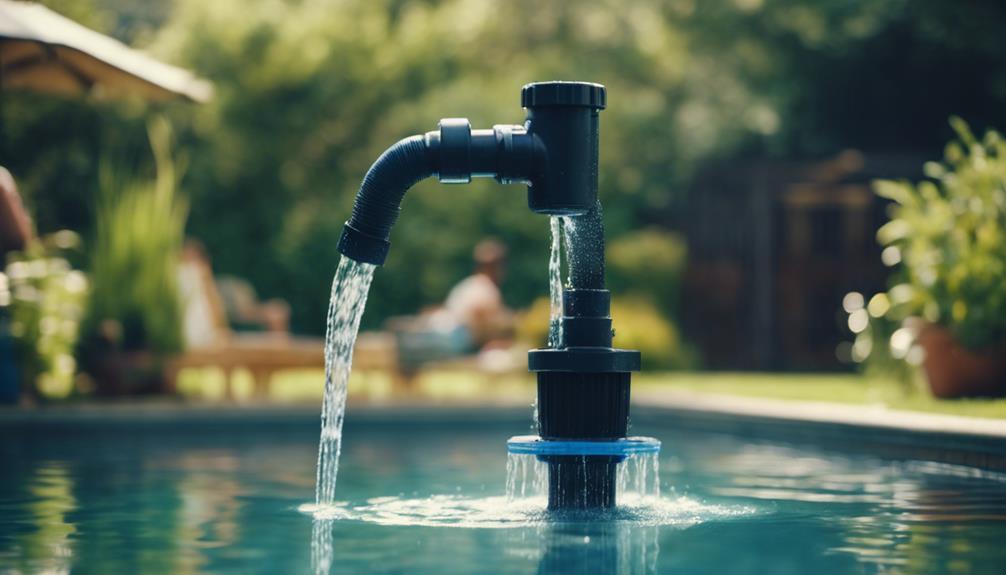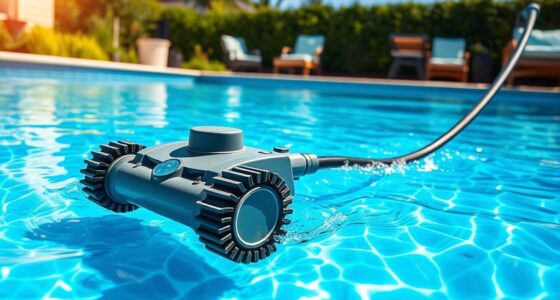To effectively care for your saltwater pool, it is important to maintain a salinity level of 2,700-3,400 parts per million to ensure clear water and optimal equipment function. Regularly testing chlorine levels and adjusting as necessary, along with maintaining proper pH balance and conducting shock treatments weekly, are crucial steps. Keeping pH levels between 7.2-7.6 will help prevent algae growth and improve chlorine effectiveness. Remember to clean the salt cell every three months to prevent build-up and rinse the pool area to prevent erosion. Regularly conducting monthly water tests and following professional guidelines will ensure a pristine swimming experience. By following these practices, you will be able to enjoy a safe and refreshing swim.
Key Takeaways
- Maintain salinity levels between 2,700-3,400 PPM for pool health.
- Test and adjust chlorine levels regularly for optimal performance.
- Keep pH levels between 7.2-7.6 to prevent algae growth.
- Clean salt cell every 3 months to maintain chlorine production.
- Conduct weekly shock treatments for water clarity and sanitation.
Proper Saltwater Pool Balance
To guarantee peak performance in your saltwater pool, maintain a salinity level between 2,700 to 3,400 PPM. This balance is essential for the overall health of your pool.
Salt is vital for generating chlorine through the process of electrolysis, ensuring clean and safe water for swimming. When the salinity levels are within the recommended range, the water remains clear, and the pool equipment functions at its best.
Additionally, proper salt levels help maintain the pH balance of the water. pH measures the acidity or alkalinity of the water, affecting both swimmer comfort and equipment longevity. By keeping the salt levels in check, you're also indirectly regulating the pH levels of your pool water.
Regular testing of the water using a digital salinity tester or salt water test strips is necessary to ensure these levels are within the desired range. Remember, a balanced saltwater pool leads to a more enjoyable swimming experience and prolongs the lifespan of your pool equipment.
Maintaining Chlorine Levels

To maintain proper chlorine levels in your saltwater pool, it's vital to test the water frequently and adjust as needed.
Balancing pH levels is also essential to guarantee the effectiveness of the chlorine in sanitizing the pool.
Don't forget the importance of shock treatments to keep the water free from contaminants and algae buildup.
Chlorine Testing Frequency
Regularly test your saltwater pool's chlorine levels to guarantee proper sanitation and safe swimming conditions. The chlorine testing frequency in a saltwater pool should be at least once a week to make sure that the free chlorine levels are between 1-3 ppm, maintaining a healthy environment for swimmers.
It's essential to adjust the salt chlorinator output based on the test results to keep the chlorine levels consistent and within the recommended range. Additionally, after periods of heavy pool use or severe weather conditions, closely monitoring the chlorine levels is important.
Balancing Ph Levels
Maintaining proper pH levels in your saltwater pool is essential for ensuring the effectiveness of chlorine and preventing issues like algae growth. To maintain chlorine effectiveness, it's important to keep pH levels within the ideal range of 7.2-7.6. Imbalanced pH levels can compromise chlorine's ability to sanitize the pool water, potentially leading to algae growth and other water quality problems. Regularly testing and adjusting the pH levels is necessary not only for chlorine effectiveness but also to prevent skin and eye irritation for swimmers.
High pH levels can reduce the potency of chlorine, requiring higher concentrations to maintain proper sanitation levels. This not only increases the cost of pool maintenance but can also be harsh on swimmers' skin and eyes.
Shock Treatment Importance
Ensuring proper chlorine levels in your saltwater pool is essential for maintaining water clarity and preventing algae growth. Shock treatment plays an important role in this process by helping to maintain adequate chlorine levels.
By eliminating contaminants and restoring sanitizer effectiveness, shock treatments help prevent algae growth and keep your pool water clear. It's recommended to shock your saltwater pool weekly or after heavy use to combat cloudy water caused by organic materials, ammonia, and other impurities that can reduce chlorine levels.
Regular shock treatments also aid in preventing chlorine-resistant bacteria, ensuring a safe and healthy swimming environment for you and your family. Following the manufacturer's guidelines for shock treatment is imperative to maximize performance and the longevity of your saltwater pool system.
Monitoring Ph Levels

To maintain peak efficiency and comfort in your saltwater pool, it is important to monitor the pH levels within the range of 7.2-7.6. Keeping the pH balanced is essential for water quality and the effectiveness of chlorine in sanitizing the pool. High pH levels can reduce the chlorine's ability to keep the water clean, while low pH levels can cause equipment corrosion and skin irritation for swimmers. Regularly testing and adjusting the pH levels will ensure proper water balance and prevent potential issues. Monitoring pH levels is vital for the overall health and clarity of your saltwater pool.
| pH Level | Effect | Action |
|---|---|---|
| High | Reduced chlorine effectiveness | Add pH decreaser |
| Low | Equipment corrosion, skin irritation | Add pH increaser |
| Balanced | Ideal water quality | Maintain within 7.2-7.6 range |
Cleaning Salt Cell Regularly

Regularly cleaning the salt cell every 3 months is essential for preventing buildup and maintaining peak chlorine production in your saltwater pool. Neglecting this task can lead to accumulated debris and scale on the salt cell, hindering its efficiency and potentially causing maintenance issues down the line.
To guarantee the functionality of the salt cell, consider cleaning it with a diluted muriatic acid solution or using a high-pressure hose. Proper maintenance not only prolongs the salt cell's lifespan but also reduces the risk of corrosion or malfunction, ultimately contributing to the overall health and performance of your saltwater pool system.
Preventing Erosion and Buildup

To prevent erosion and buildup in your saltwater pool, always remember to rinse areas around the pool regularly to avoid damage from salt splash out. Salt splash out can gradually deteriorate surfaces, leading to costly repairs.
Additionally, keep an eye out for calcium carbonate buildup, often caused by high pH levels in the pool, which can result in scaling issues. Regularly cleaning the pool liner and automatic cover is vital to prevent buildup and extend their lifespan.
Maintaining balanced pH levels is essential not only for preventing calcium carbonate buildup but also to avoid equipment corrosion. Corrosion can greatly impact the pool's integrity and functionality. Make sure to test and balance pH levels consistently to safeguard your pool equipment.
Remember to inspect the salt cell every three months for calcium buildup. If necessary, clean it with a diluted muriatic acid solution to prevent performance issues.
Ensuring Water Circulation

Maintain proper water circulation in your saltwater pool to uphold balanced chemical distribution and prevent issues like algae growth and poor water quality. Essential circulation is vital for ensuring that sanitizers and chemicals are evenly dispersed throughout the pool, reducing the risk of algae growth, uneven chemical distribution, and degraded water quality.
Efficient water circulation also helps prevent stagnant areas, minimizes debris buildup, and promotes consistent water temperature throughout the pool. To achieve this, it's important to regularly run the pump and adjust circulation settings to optimize water flow and pool filtration.
Weekly Shock Treatments

Performing weekly shock treatments in your saltwater pool is essential for eliminating organic contaminants and maintaining water clarity.
These treatments help prevent algae growth, remove chloramines, and enhance the efficiency of chlorine in your pool.
Using a non-chlorine shock or a saltwater-specific shock product is recommended for best results.
Shock Treatment Importance
Consistently administering shock treatments in your saltwater pool is essential for preserving water quality and cleanliness. Weekly shock treatments play a crucial role in eliminating organic contaminants, bacteria, and algae from your pool water. By following a regular shock treatment schedule, you can prevent issues such as cloudy water, algae growth, and unpleasant odors, guaranteeing that your pool remains clear, safe, and inviting for swimmers.
To emphasize the importance of shock treatments, let's take a closer look at the benefits they offer:
| Benefits of Weekly Shock Treatments | Explanation |
|---|---|
| Eliminates Contaminants | Helps remove organic debris, bacteria, and algae. |
| Prevents Water Issues | Reduces the likelihood of cloudy water, algae growth, and unpleasant odors. |
| Maintains Water Quality | Ensures that your pool water remains clear, safe, and inviting for swimmers. |
| Enhances Overall Pool Experience | Contributes to a healthier and more enjoyable swimming environment. |
Proper Application Techniques
To guarantee effective weekly shock treatments in your saltwater pool, make sure to select a high-quality shock treatment product specifically formulated for saltwater pools to prevent damage to your pool system.
When applying shock treatments, follow the manufacturer's instructions meticulously to make certain the correct dosage and application techniques. Start by dissolving the shock treatment granules in a bucket of water before evenly dispersing the solution around the perimeter of the pool. This method helps prevent concentrated areas of shock treatment that could potentially damage pool surfaces.
Remember, shock treatments are essential for oxidizing organic contaminants, breaking down chloramines, and maintaining water clarity in your saltwater pool. By employing proper application techniques, you not only ensure the effectiveness of the shock treatment but also contribute to a clean and safe swimming environment by eliminating bacteria, preventing algae growth, and maintaining balanced water chemistry.
Regular maintenance through weekly shock treatments is key to enjoying a pristine saltwater pool all year round.
Frequency Recommendations
For ideal maintenance of your saltwater pool, it is recommended to conduct weekly shock treatments to uphold water clarity and sanitation. Shock treatments play an important role in oxidizing and eliminating organic contaminants that regular chlorine may not effectively address. Following the manufacturer's guidelines for the proper amount of shock treatment based on your pool size is essential to achieve best results. Factors such as heavy pool usage, weather conditions, and water quality can influence the frequency of shock treatments needed. By implementing regular shock treatments, you can effectively prevent algae growth and maintain a safe and inviting swimming environment for all.
| Frequency Recommendations | Benefits |
|---|---|
| Weekly shock treatments | Maintain water clarity and sanitation |
| Adjust based on usage, weather, and water quality | Prevent algae growth and ensure swimmer safety |
Regular Skimming and Brushing

Skim your saltwater pool surface daily to remove debris and prevent buildup that can affect water quality. Using a pool brush weekly is also essential to scrub the pool walls and floor, preventing algae growth and enhancing circulation. Regular skimming and brushing play an important role in maintaining a clean pool environment by reducing the strain on the filtration system.
Here are some essential practices for regular skimming and brushing:
- Daily Skimming: Removing debris such as leaves, insects, and other contaminants from the water surface prevents them from sinking and causing water quality issues.
- Weekly Brushing: Using a pool brush to scrub the walls and floor of the pool helps prevent algae growth, improves water circulation, and enhances the effectiveness of pool chemicals.
- Consistent Maintenance: Regular skimming and brushing not only keep your pool clean but also aid in evenly distributing chemicals, preventing scale buildup, and maintaining a sparkling and inviting pool for your enjoyment.
Monthly Water Testing

Maintain excellent water quality in your saltwater pool by conducting monthly water testing to monitor key chemical levels and prevent potential issues.
Testing the water chemistry of your saltwater pool on a monthly basis is essential to guarantee that the pH, alkalinity, and chlorine levels are within the recommended range. By regularly testing these levels, you can maintain a balanced pool environment and prevent water quality issues from arising.
Additionally, monitoring the salt levels monthly is important, as they should ideally fall between 3,000-5,000 parts per million (PPM) to ensure the proper functioning of your saltwater system.
Moreover, testing for calcium hardness and cyanuric acid monthly is equally important to prevent scaling, corrosion, and algae growth in your pool. By consistently conducting monthly water tests in your saltwater pool, you can detect any imbalances early on and take the necessary steps to maintain ideal water quality levels.
Regular monitoring and testing are key components of effective saltwater pool maintenance to ensure a clean and healthy swimming environment for you and your family.
Seeking Professional Assistance

When it comes to caring for your saltwater pool, seeking professional assistance can offer numerous benefits. Expert technicians can provide tailored maintenance services, ensuring your pool remains in top condition.
From routine maintenance to troubleshooting complex issues, professionals can help you keep your saltwater pool running smoothly.
Professional Maintenance Benefits
Consider consulting with professional pool maintenance services to guarantee high-quality care for your saltwater pool. Trained professionals have the expertise to handle complex issues like salt cell maintenance efficiently. Here are three key benefits of seeking professional assistance:
- Expertise and Knowledge:
Professional maintenance services bring trained professionals who understand the intricacies of saltwater pool care. They can perform tasks like salt cell maintenance accurately, ensuring your pool functions at its best.
- Preventative Maintenance:
By hiring professionals, you can prevent costly repairs in the future. These experts can identify potential issues early on and address them promptly, saving you both money and time in the long run.
- Personalized Maintenance Plans:
Pool service providers can offer customized maintenance plans tailored to your pool's specific needs. This personalized approach ensures that your pool receives the care it requires, prolonging its lifespan and keeping it in excellent condition.
Expert Troubleshooting Services
For efficient resolution of complex issues such as cloudy water or equipment malfunctions in your saltwater pool, seeking expert troubleshooting services is crucial. Professional assistance in pool maintenance can make a significant difference in identifying and addressing problems promptly. Trained professionals have the expertise to diagnose issues like chemical imbalances, faulty equipment, or unclear water quality, guaranteeing your pool remains safe and enjoyable.
By opting for troubleshooting services, you not only guarantee proper maintenance but also extend the lifespan of your saltwater pool system. These experts can provide tailored solutions based on the specific needs of your pool, offering peace of mind and maintaining a clean and safe environment for all users.
Investing in professional help for troubleshooting services is a proactive approach that can prevent minor issues from escalating into more significant problems, ultimately saving you time and money in the long run.
Frequently Asked Questions
What Is Routine Maintenance for a Salt Water Pool?
Maintaining a saltwater pool involves regular testing and adjustment of chemical levels like pH, free chlorine, and salt.
Cleaning the salt chlorinator cell every 3 months is essential for peak performance.
Weekly tasks include skimming debris, brushing surfaces, and vacuuming to guarantee water clarity.
Keeping salt levels between 2,700 to 3,400 PPM is necessary for effective chlorination.
Run your filter system for a minimum of 8 hours daily to circulate water and distribute salt evenly.
Is It Difficult to Maintain a Saltwater Pool?
Maintaining a saltwater pool isn't inherently difficult; it just requires consistent attention to water chemistry.
Contrary to common misconceptions, saltwater pools often demand less upkeep than traditional chlorine pools.
By regularly testing and adjusting salt, pH, and chlorine levels, you can guarantee a well-balanced pool environment.
With proper care, including routine checks on the salt chlorinator cell, you can enjoy the benefits of a clean and clear saltwater pool with relative ease.
What Should I Balance First in My Saltwater Pool?
First, balance the pH level in your saltwater pool to fall between 7.2-7.6 for ideal water quality.
Next, focus on maintaining free chlorine levels between 1-3 ppm for effective sanitation.
Adjust total alkalinity levels to 80-120 ppm for stability and pH control.
Then, monitor calcium hardness within 200-400 ppm to prevent scaling and corrosion.
What Are Tips for Salt Water Pools?
When maintaining a saltwater pool, it is essential to ensure that your salt levels fall within the 2,700 to 3,400 PPM range. This can be done by testing monthly with a digital salinity tester. Opting for a reliable chlorination system like Hayward's Aquarite S3 is recommended for efficient chlorine production.
After adding salt to the pool, it is crucial to circulate it for 24 hours. Make sure to run the pump for at least 8 hours daily to ensure proper distribution of the salt throughout the pool. Using high-purity pool-grade salt is advisable to maintain water quality.
To prevent calcium buildup and ensure top system performance, it is important to clean the salt cell every 3 months. Regular maintenance of the salt cell will help prolong its lifespan and keep your saltwater pool running smoothly.
Conclusion
In caring for a saltwater pool, remember that proper maintenance is key to enjoying crystal-clear, invigorating water.
Just as a gardener tends to their plants to promote healthy growth, you must diligently care for your pool to guarantee its longevity and cleanliness.
By following the best practices outlined above, you can create a serene oasis in your backyard that brings joy and relaxation to all who dip their toes in its waters.










